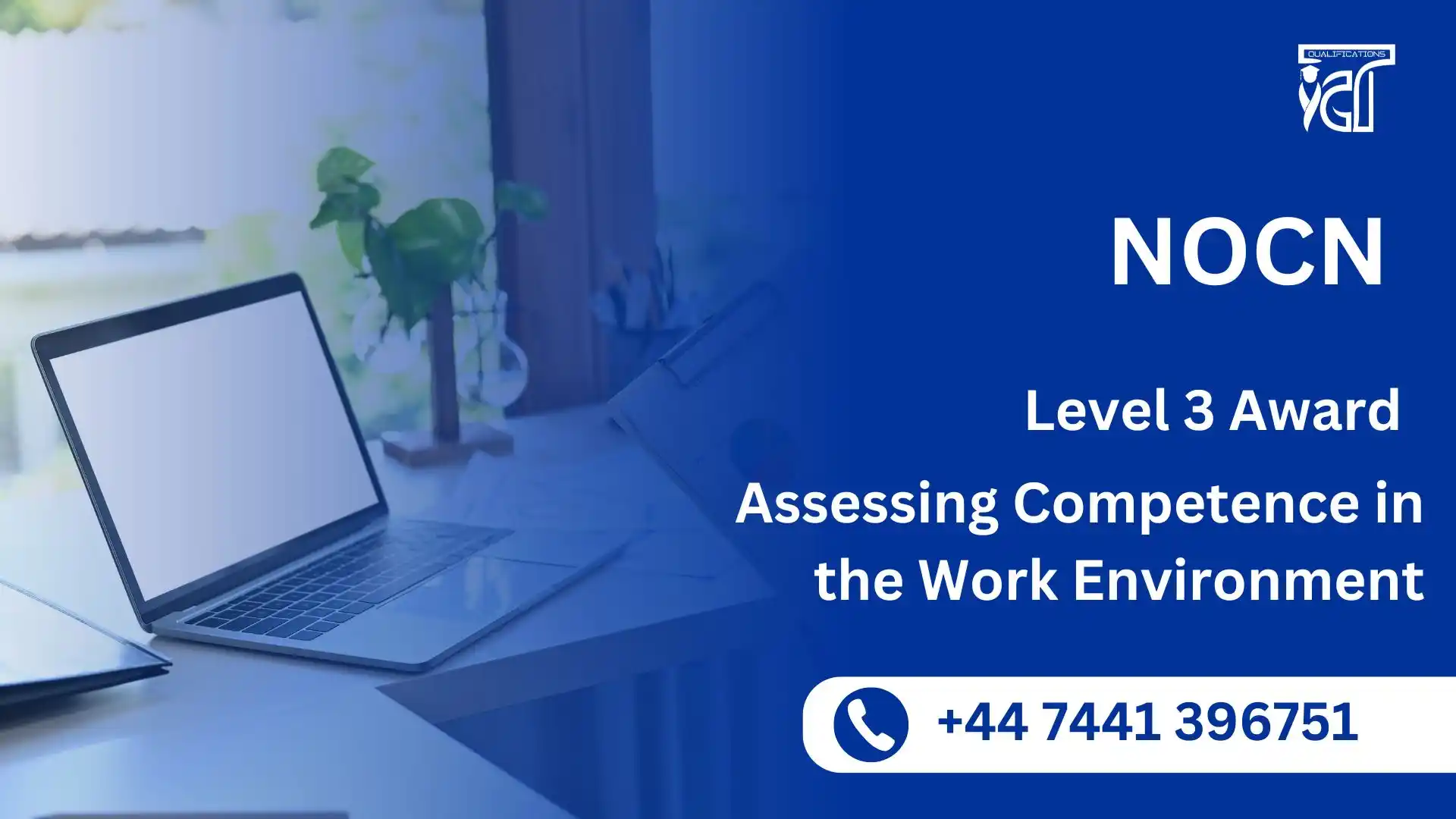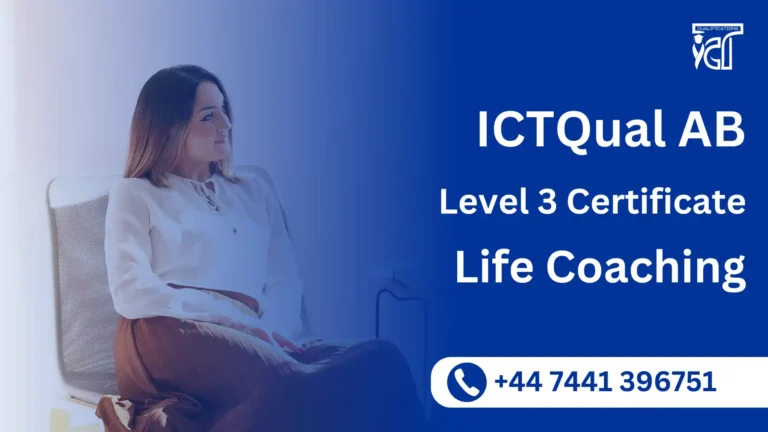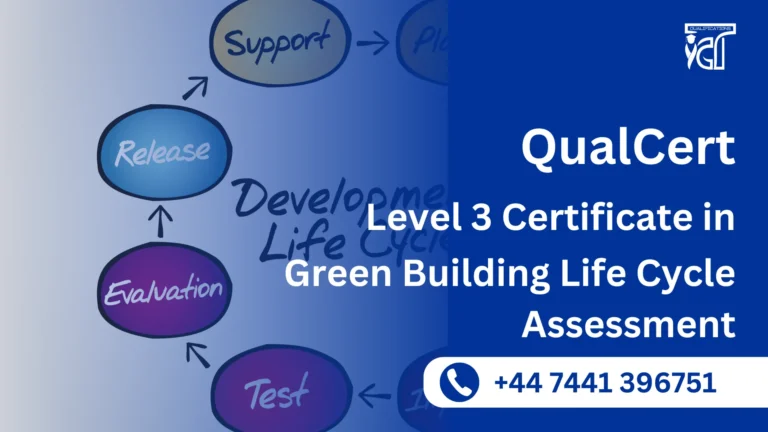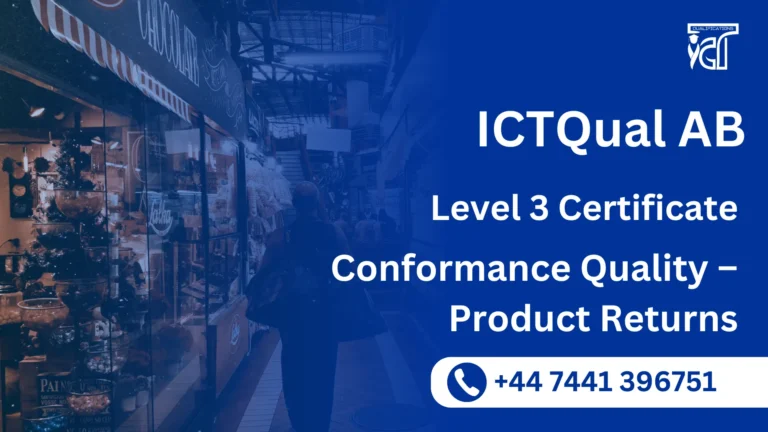In today’s competitive workforce, the ability to assess and evaluate competency is a crucial skill in many industries. The NOCN Level 3 Award in Assessing Competence in the Work Environment offers a specialized qualification for individuals seeking to develop their competence as assessors in the workplace. This OFQUAL regulated qualification is entirely assignment-based, providing an accessible and flexible way for professionals to gain the necessary skills and knowledge required to assess individuals in a real-world work environment effectively.
The NOCN Level 3 Award in Assessing Competence in the Work Environment is designed for individuals who are responsible for assessing and evaluating the competence of employees in their workplace. This qualification is ideal for professionals in industries that require formal assessments of workplace skills, including sectors like construction, healthcare, retail, and education.
This qualification focuses on assessing learners’ competence within their job roles, using a combination of practical assessments, workplace observations, and evidence gathering. As an OFQUAL regulated qualification, it meets the national standards set by the UK government, ensuring that it is both credible and valuable in various professional settings.
Enrolling in the NOCN Level 3 Award is a straightforward process. Learners can apply through accredited training centers offering the qualification. Many of these centers offer online and blended learning options, allowing for a convenient and flexible learning experience.
Before enrolling, it’s important to ensure that you meet the entry requirements. These typically include a minimum of Level 2 English and Math qualifications and relevant experience in the work environment that you wish to assess.
The NOCN Level 3 Award in Assessing Competence in the Work Environment is an excellent qualification for individuals who are looking to formalize and enhance their assessment skills. As an OFQUAL regulated qualification, it is highly regarded across various industries, making it a valuable credential for anyone looking to pursue a career in assessment. With its assignment-based assessment, learners can enjoy the flexibility to study at their own pace while gaining practical, real-world experience.
NOCN Level 3 Award in Assessing Competence in the Work Environment
The NOCN Level 3 Award in Assessing Competence in the Work Environment qualification consists of Total Qualification Time (TQT): 90 and Credits : 9 for the completed qualification.
Mandatory units
| Sr# | Unit Title |
|---|---|
| 1 | Assess occupational competence in the work environment |
| 2 | Understanding the principles and practices of assessment |
GLH (Guided Learning Hours) and TQT (Total Qualification Time) are terms commonly used in vocational qualifications to help define the amount of time a learner is expected to spend on heir studies.
1. GLH (Guided Learning Hours)
GLH refers to the number of hours a learner spends being directly taught, supervised, or supported during their course. This includes the time spent in activities such as:
- Classroom instruction
- Practical workshops
- One-on-one tutoring or mentoring sessions
- Online learning sessions with tutor support
In other words, GLH represents the time that learners are actively engaged with their instructors or learning activities.
2. TQT (Total Qualification Time)
TQT represents the total amount of time a learner is expected to invest in completing a qualification, including:
- GLH (Guided Learning Hours): Time spent on direct learning, as explained above.
- Self-Directed Learning: This includes time spent on independent study, research, assignment completion, preparation for exams, and any other work the learner does outside of direct teaching hours.
TQT is a broader measure that includes all the time required to achieve the qualification. It helps learners and employers understand the overall commitment required for the qualification.
Key Differences Between GLH and TQT:
- GLH focuses on direct learning with guidance or supervision.
- TQT includes GLH as well as independent study time and other learning-related activities.
Example:
If a qualification has a TQT of 600 hours and a GLH of 250 hours, it means the learner should spend 250 hours in direct learning (classroom, online, or tutor-led sessions) and 350 hours on independent study or research.
Learning Outcomes of NOCN Level 3 Award in Assessing Competence in the Work Environment
Unit 1: Assess Occupational Competence in the Work Environment
- Understanding Assessment Planning and Preparation
- Demonstrate the ability to plan and organize assessments in the workplace.
- Identify the key components needed to assess occupational competence effectively.
- Develop assessment strategies that align with organizational goals and learner needs.
- Conducting Fair and Valid Assessments
- Apply assessment methods to evaluate employees’ competence in their actual work environment.
- Ensure that assessments are valid, reliable, and meet the required standards.
- Demonstrate the ability to observe and assess the work of others in a fair and unbiased manner.
- Providing Constructive Feedback to Learners
- Deliver clear, actionable feedback based on assessment results.
- Support learners in improving their skills and achieving competencies.
- Document assessment findings and provide learners with meaningful progress reports.
Unit 2: Understanding the Principles and Practices of Assessment
- Knowledge of Assessment Principles and Methods
- Understand and explain the core principles of assessment, including fairness, validity, and reliability.
- Identify various assessment methods, such as observation, questioning, and work product review.
- Evaluate the appropriateness of different assessment methods in different contexts.
- Understanding Legal and Regulatory Frameworks
- Recognize the legal requirements and ethical considerations involved in assessment.
- Ensure that assessments comply with industry standards, organizational policies, and relevant regulations.
- Understand the importance of maintaining confidentiality and data protection during the assessment process.
- Reflective Practice and Continuous Improvement
- Reflect on your own assessment practice to identify areas for improvement.
- Implement strategies for enhancing your assessment skills and techniques.
- Engage in continuous professional development to stay current with assessment best practices.
These learning outcomes outline the essential skills and knowledge gained from the units, ensuring that learners can conduct assessments competently and in line with industry standards.
The NOCN Level 3 Award in Assessing Competence in the Work Environment offers a wide range of benefits for professionals who are looking to develop their skills in workplace assessment. This OFQUAL regulated qualification is designed to provide individuals with the essential knowledge and practical skills needed to assess the competence of others in real-world work environments. Below are the key benefits of undertaking this qualification:
1. Industry Recognition and Credibility
- As an OFQUAL regulated qualification, the NOCN Level 3 Award is nationally recognized and meets the standards set by the UK’s regulatory body for qualifications. This gives learners a certification that is trusted by employers and educational institutions, enhancing their professional credibility.
- The qualification is valued across a variety of sectors, including construction, healthcare, education, manufacturing, and more, making it a versatile credential that can open doors to many industries.
2. Flexible, Assignment-Based Assessment
- The qualification is assignment-based, meaning there are no formal exams. Learners complete assignments that demonstrate their ability to assess competence in the workplace. This flexible approach allows individuals to study at their own pace while applying practical knowledge to real-world scenarios.
- The assignment-based format also allows learners to balance the course with their professional and personal commitments, making it an ideal choice for those who need a flexible learning schedule.
3. Improved Assessing and Feedback Skills
- The course enhances your assessment skills, teaching you how to effectively plan, conduct, and evaluate assessments in a work environment. You will also learn how to provide constructive feedback to employees or trainees, which is crucial for their development.
- Developing these skills not only makes you a more effective assessor but also helps you build strong professional relationships by guiding and supporting others in their growth.
4. Practical Experience in the Workplace
- Learners will gain valuable hands-on experience in assessing the competence of individuals within their actual work environments. This practical application ensures that you can confidently carry out assessments once you complete the course, giving you real-world experience that is highly sought after by employers.
- This real-world focus also means that the course is highly relevant to your day-to-day job, allowing you to immediately apply what you learn.
5. Career Advancement Opportunities
- Obtaining the NOCN Level 3 Award provides a significant boost to your career by opening up opportunities for advancement into roles such as assessors, trainers, quality assurance officers, and other assessment-related positions.
- It is especially beneficial for those working in vocational or industry-specific training, as it formalizes your skills in assessing competence within your field, making you more competitive in the job market.
6. Enhanced Confidence as an Assessor
- The qualification provides learners with the knowledge and tools necessary to confidently assess the skills and abilities of others. You will learn how to make valid, fair, and reliable assessments, increasing your confidence in your ability to assess competently and professionally.
- This confidence will translate into more effective decision-making, better feedback, and improved outcomes for those you assess.
7. Compliance with Legal and Regulatory Requirements
- The NOCN Level 3 Award ensures that you are aware of the legal and regulatory requirements that govern assessment processes in the workplace. Understanding these requirements is essential for ensuring that assessments are fair, transparent, and compliant with industry standards.
- Being compliant with these standards not only protects the organization but also ensures the credibility and fairness of the assessments you carry out.
8. Professional Development and Continuous Learning
- This course encourages reflective practice, helping you assess your strengths and areas for improvement as an assessor. By engaging with continuous professional development, you stay updated on best practices, techniques, and evolving standards in assessment.
- This focus on lifelong learning helps you stay relevant and adaptable in an ever-changing work environment.
9. Boost to Your Employability
- Holding the NOCN Level 3 Award is a clear indicator to employers that you have the necessary skills and knowledge to effectively assess competence in a work environment. This makes you a more attractive candidate for roles that require assessment, training, or evaluation responsibilities.
- It also signals that you are committed to developing your professional skills, which is highly valued by employers seeking motivated and capable employees.
10. Increased Knowledge of Assessment Methods
- The course covers a variety of assessment methods, including observation, questioning, and evidence collection. This gives learners a comprehensive toolkit for assessing competence in different settings and ensures that they are equipped to handle diverse workplace scenarios.
- By gaining expertise in different assessment techniques, you’ll be able to apply the most appropriate methods to suit each individual and context, leading to more accurate and reliable assessments.
11. Networking Opportunities
- As you complete the qualification, you will likely engage with other professionals in the field, creating valuable networking opportunities. These connections can be beneficial for career development, knowledge sharing, and gaining insights from other experienced assessors.
- Networking within training and assessment communities can also lead to potential job opportunities and collaborations in the future.
The NOCN Level 3 Award in Assessing Competence in the Work Environment provides a comprehensive, flexible, and practical qualification that helps you develop the skills necessary to assess competence effectively in a real-world work setting. Whether you’re aiming to formalize your existing assessment skills, move into a new role, or improve your career prospects, this qualification offers numerous benefits that enhance your employability, confidence, and professional development.
With its OFQUAL regulated status, assignment-based assessment, and emphasis on real-world applications, the course is an invaluable asset for anyone looking to pursue or advance a career in assessment. It ensures that you are well-equipped to carry out assessments in a fair, reliable, and legally compliant manner, contributing to the ongoing success of the individuals and organizations you assess.
The NOCN Level 3 Award in Assessing Competence in the Work Environment is designed for individuals who are responsible for assessing the competence of others within their workplace. The ideal learner for this course includes professionals who are already engaged in or are looking to take on formal assessment roles within their industries. Below are the key characteristics of the ideal learner for this qualification:
1. Experienced Professionals in Supervisory or Management Roles
- Supervisors/Managers: Individuals already working in supervisory or managerial roles who oversee employees and are looking to formalize their assessment skills. The qualification is ideal for those who need to assess employee performance or competencies as part of their role.
- Team Leaders: Professionals responsible for monitoring and evaluating team performance, who wish to develop formal assessment methods to evaluate employee skills and capabilities in line with organizational standards.
2. Vocational Trainers and Instructors
- Trainers in Vocational Settings: Individuals who provide training in specific industries (e.g., construction, healthcare, manufacturing) and wish to gain formal qualifications in assessing competency in the workplace.
- Industry-Specific Trainers: Professionals who deliver sector-specific training programs and need to assess their learners’ competence in the real work environment.
3. Aspiring Workplace Assessors
- New or Aspiring Assessors: Professionals looking to move into assessment roles or those who have informal experience in assessing employees or trainees but require formal qualifications. This includes individuals who are looking to become qualified assessors in various sectors.
- Internal Verifiers: Those working as internal verifiers or quality assurance officers who wish to gain a more in-depth understanding of assessment and the standards required in regulated assessments.
4. Mentors and Coaches
- Workplace Mentors: Individuals who mentor employees and want to enhance their ability to assess competencies, provide constructive feedback, and ensure that the mentoring process is aligned with organizational and industry standards.
- Coaches: Professionals who provide coaching in their workplace and wish to formalize their skills to assess and guide others more effectively.
5. Individuals Seeking Career Progression
- Career Advancers: Employees who are looking to gain a formal qualification in assessment to progress in their current career, particularly those seeking roles that involve evaluating, mentoring, or training others.
- Professionals Aiming for Assessing Roles: Those who wish to take on roles such as an assessor, trainer, or evaluator and need a recognized qualification to boost their career in the training or educational sectors.
6. Professionals with Industry-Specific Experience
- Specialist Assessors: Those who have industry-specific knowledge and experience (e.g., healthcare, construction, hospitality, etc.) and want to become qualified assessors within their area of expertise. The qualification allows individuals to assess others in their professional field, ensuring skills and competencies are up to industry standards.
- Subject Matter Experts (SMEs): Professionals who possess in-depth knowledge of specific industries and want to formalize their ability to assess and evaluate the competence of others within that sector.
7. Individuals with a Strong Understanding of Work Environment Processes
- Employees in Operational Roles: Individuals who work in operational roles within their organization and have a good understanding of day-to-day work processes. They are looking to take on additional responsibilities, such as assessing colleagues’ competence in performing their tasks.
- Quality Assurance or Compliance Officers: Professionals who are responsible for ensuring that industry standards and regulations are met, and who need to assess employee performance in a way that aligns with regulatory requirements.
8. Learners Interested in Flexible Learning
- Self-Motivated Learners: Individuals who prefer a flexible, assignment-based learning format that allows them to complete the qualification at their own pace, making it ideal for those with work or personal commitments.
- Online and Blended Learning Enthusiasts: Those looking for a flexible learning environment, as many accredited training providers offer online or blended learning options, which allow learners to fit the course around their existing responsibilities.
Key Characteristics of the Ideal Learner:
- Motivated and Self-Disciplined: The course requires independent learning and the completion of assignments, so learners should be motivated to manage their time and complete tasks without the need for constant supervision.
- Relevant Workplace Experience: Practical experience in a workplace setting, preferably with some knowledge of assessment or supervisory roles, is helpful to fully engage with the course content.
- Effective Communication Skills: The ability to communicate clearly and effectively with colleagues, trainees, or employees is essential, as the qualification focuses on providing feedback and conducting assessments in the workplace.
- Commitment to Professional Development: A commitment to improving one’s professional skills and advancing in the field of assessment and training.
The NOCN Level 3 Award in Assessing Competence in the Work Environment is ideal for professionals who are looking to formalize their assessment skills and enhance their role in evaluating the competence of others within the workplace. Whether you are a supervisor, manager, trainer, or aspiring assessor, this qualification will provide you with the practical skills and recognized credentials to become an effective workplace assessor.
Entry Requirements
Register Now
Qualification Process
Qualification Process NOCN Level 3 Award in Assessing Competence in the Work Environment
- Self-Assessment:
Begin by evaluating your eligibility to ensure you meet the qualification requirements, including work experience, knowledge, and language proficiency. - Registration:
Complete your registration by submitting the required documents, including a scanned copy of a valid ID, and paying the registration fee. - Induction:
An assessor will conduct an induction to confirm your eligibility for the course and explain the evidence requirements. If you do not meet the criteria, your registration will be canceled, and the fee will be refunded. - Assignments & Evidence Submission:
Provide all assignments and the necessary evidence based on the assessment criteria outlined in the course. If you are unsure of the required evidence, consult with the assessor for guidance on the type and nature of evidence needed. - Feedback and Revision:
The assessor will review your submitted evidence and provide feedback. Evidence that meets the criteria will be marked as “Criteria Met,” while any gaps will be identified. You will be asked to revise and resubmit if needed. - Competence Evidence:
Submit final evidence demonstrating that all learning outcomes have been met. This evidence will be marked as “Criteria Met” by the assessor once it is satisfactory. - Internal Quality Assurance (IQA):
The Internal Quality Assurance Verifier (IQA) will review your evidence to ensure consistency, quality, and compliance with standards. - External Verification:
The IQA will submit your portfolio to NOCN External Quality Assurance Versifier (EQA) for final confirmation. The EQA may contact you directly to verify the authenticity of your evidence. - Certification:
Upon successful completion of all checks, NOCN will issue your official certificate, confirming that you have attained the NOCN Level 3 Award in Assessing Competence in the Work Environment







